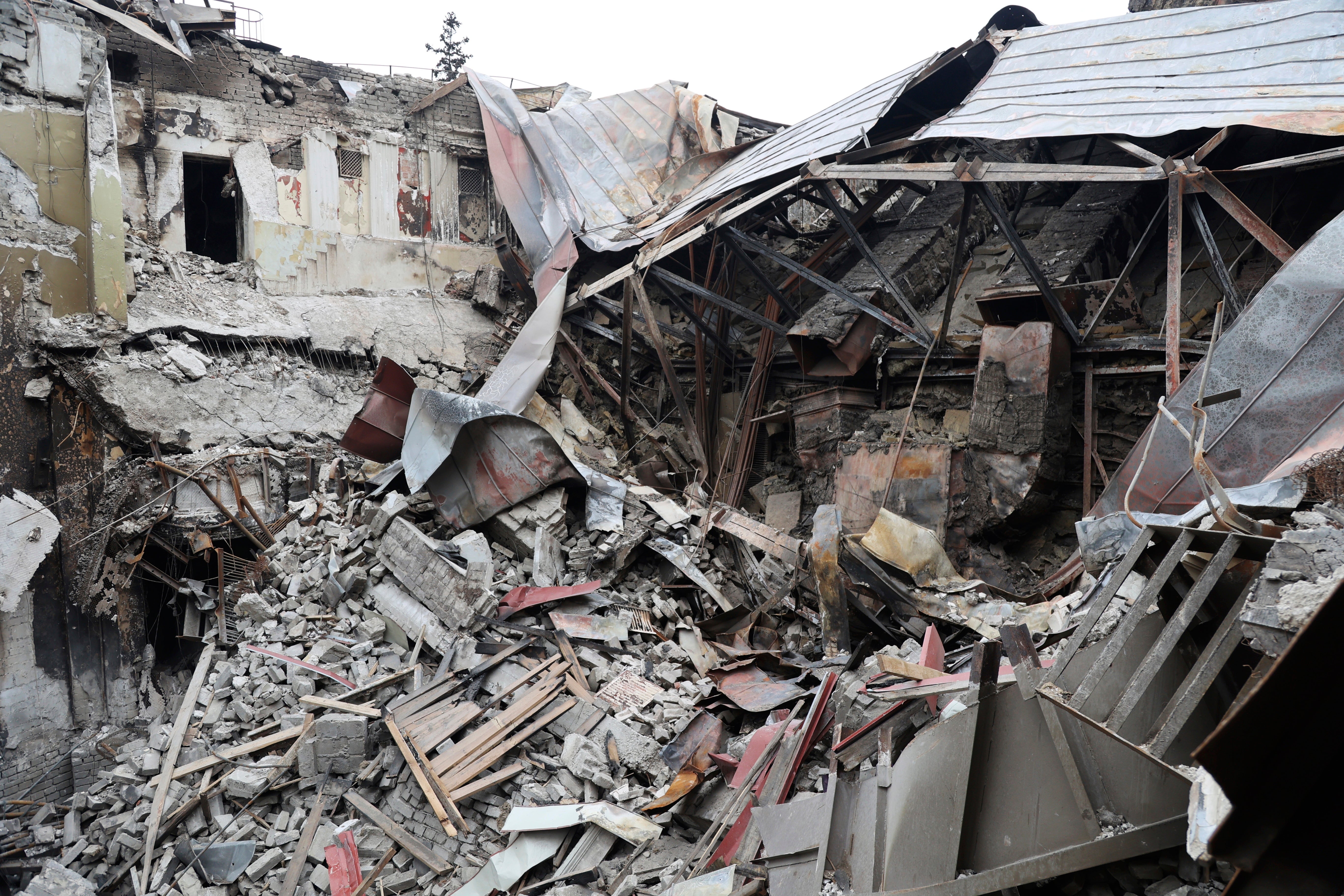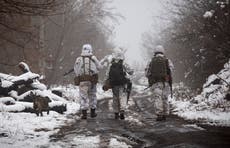Deadly airstrike on Mariupol theatre a ‘clear war crime’, Amnesty inquiry finds
Organisation concluded Russian military knew hundreds of civilians were sheltering inside but dropped bombs anyway

Your support helps us to tell the story
From reproductive rights to climate change to Big Tech, The Independent is on the ground when the story is developing. Whether it's investigating the financials of Elon Musk's pro-Trump PAC or producing our latest documentary, 'The A Word', which shines a light on the American women fighting for reproductive rights, we know how important it is to parse out the facts from the messaging.
At such a critical moment in US history, we need reporters on the ground. Your donation allows us to keep sending journalists to speak to both sides of the story.
The Independent is trusted by Americans across the entire political spectrum. And unlike many other quality news outlets, we choose not to lock Americans out of our reporting and analysis with paywalls. We believe quality journalism should be available to everyone, paid for by those who can afford it.
Your support makes all the difference.Russian forces committed a “clear war crime” in Ukraine’s coastal city of Mariupol when they launched a deadly airstrike on a theatre they knew was sheltering hundreds of civilians, according to a new investigation by Amnesty International.
The global rights group has urged the International Criminal Court, and all other courts with jurisdiction, to immediately investigate the attack as a war crime in light of the evidence it unearthed.
The human rights organisation spent three months examining the 16 March strike on the city’s Drama Theatre, which it says killed at least a dozen people and injured many more.
After speaking to more than 28 survivors inside or adjacent to the building, commissioning a physicist to build a mathematical model of the detonation and analysing satellite imagery, Amnesty concluded that the attack was almost certainly carried out by Russian fighter aircraft.
It also concluded that the Russian military must have known that hundreds of civilians were sheltering there and dropped two 500kg bombs anyway.
The total death toll from the attack in the city’s Tsentralnyi district is still unknown. The strategic port was under weeks of siege and is now in Russian hands, preventing investigators from visiting the site.
The regional authorities initially estimated as many as 300 died. However, Amnesty said it was likely that a dozen perished because in the two days before the attack several large convoys of cars had managed to evacuate the city.
“After months of rigorous investigation, analysis of satellite imagery and interviews with dozens of witnesses, we concluded that the strike was a clear war crime committed by Russian forces,” said Agnès Callamard, Amnesty International’s secretary general.
“Many people were injured and killed in this merciless attack. Their deaths were probably caused by Russian forces deliberately targeting Ukrainian civilians.
“Through the air and on the ground, Russian forces have been on a well-documented and deliberate killing spree of civilians in Ukraine.”
She added that thorough investigations were urgently needed in order to hold the perpetrators accountable.
“The International Criminal Court, and all others with jurisdiction over crimes committed during this conflict, must investigate this attack as a war crime,” she added.
At the time of the attack, Mariupol, a strategic port city, was under some of the heaviest bombardments since Russia invaded Ukraine in February, forcing civilians to take shelter in their basements at home or in communal shelters.
The city’s Drama Theatre had become a central hub for distribution of food, water and medicine as supplies were strangled and water and power supplies were cut.
Organisers tried to ward off an air attack by writing in Cyrillic “children” on the forecourts of the complex.
Amnesty concluded that this would have been clearly visible to Russian pilots and on satellite imagery.
Despite this, it said, Russian bombs struck shortly after 10am, producing a large explosion that caused the roof and huge portions of two main walls to collapse.
After commissioning a physicist to build a mathematical model of the detonation, Amnesty determined that Russian fighter jets – such as the Su-25, Su-30 or Su-34 – which are based at a nearby Russian airfield, dropped two 500kg bombs.
A teenager who was sheltering in the basement with her boyfriend and her mother when the bombs struck told Amnesty: “In a second, everything changed.
“Everything jumped up. People started screaming. It was full of dust. I saw people bleeding,” the teen added.
Yehven Hrebenstskii, who found the body of his father Mykhailo inside the concert hall, told Amnesty that police tried to pull people out of the rubble.
“At first, I saw his [Mykhailo’s] arm. I saw a familiar hand. His face was covered with blood. His body was covered with bricks. I didn’t want my mum to see.”
Witnesses outside said they could hear a plane and the sound of the bombs dropping.
“I saw the roof of the building explode. It jumped 20 metres and collapsed; then I saw a lot of smoke and rubble,” Gregory Golovniov, a 51-year-old businessman, said.




Join our commenting forum
Join thought-provoking conversations, follow other Independent readers and see their replies
Comments